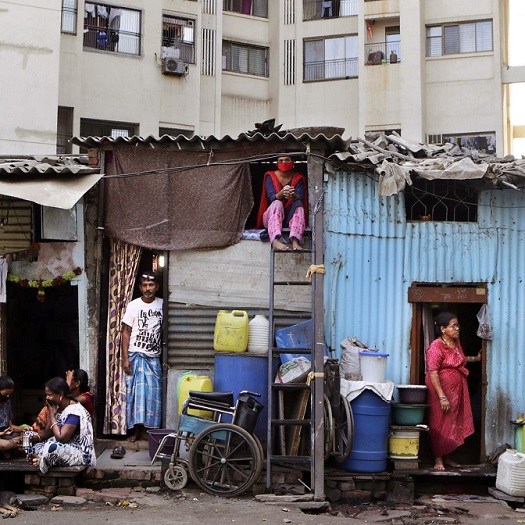“COVID-19 has been likened to an x-ray, revealing fractures in the fragile skeleton of the societies we have built. It is exposing fallacies and falsehoods everywhere: The lie that free markets can deliver healthcare for all; The fiction that unpaid care work is not work; The delusion that we live in a post-racist world; The myth that we are all in the same boat. While we are all floating on the same sea, it’s clear that some are in superyachts, while others are clinging to the drifting debris.”
Antonio Guterres, UN Secretary-General
The COVID-19 pandemic emerged as a health crisis in the beginning, later on, it evolved into a global economic crisis, threatening jobs, incomes, and economic activities all around the world. While the worldwide death toll due to the pandemic has exceeded 2.9 million in the first week of April 2021, debates over the production and the distribution of the jabs have started to heat. After one year of worldwide grapple, there is still no sufficient symptom of normalization and the world continues to stay in the grip of the pandemic. The prospect of economic and social recovery remains uncertain.
The cost of the pandemic on the world economy has been devastating. The World Bank estimations showed that the world economy contracted by 4.3% in 2020. The Eurostat estimated GDP fall for 2020 by 6.8% in the Euro area and by 6.4% in the EU. Industrial production has dropped on average by around 28% and approached 60% at most in G20 countries between February and April 2020.
The containment measures such as lockdowns and high-scale closures to mitigate and halt the pandemic have severely disrupted the global economic and social activities leading to an acute and unprecedented fall in employment.
The unemployment rate in the US increased to 14.8%, an unprecedented peak not experienced since data gathering began in 1948, and the total nonfarm payroll employment dropped by 20.5 million in April 2020.
The unprecedented fall in employment levels and bankruptcies have increased income inequality all over the world. Millions either lost their jobs and therefore their incomes or forced to work fewer hours causing deterioration in incomes. Some companies negotiated with workers over wage cuts in collective agreements.
Respondents of a survey study on who still have a paid job in early April 2020 reported that they had fewer earnings in March compared to January and February (35% in the US, 30% in the UK, and 20% in Germany). A
lthough countries have put emergency aid programs to support their citizens financially, some countries surprisingly enforced pay cuts in the public sector.
A recent report by ILO estimated that fall in worldwide working hours in 2020 was equivalent to 255 million full-time jobs in comparison to the fourth quarter of 2019, which were about four times more than during the global financial crisis in 2009, and drop in the global employment in 2020 were 114 million jobs relative to 2019.
A historically unprecedented disruption in labour markets has been leading to immense loss of income affecting hundreds of millions of households. The report revealed that global labour income decreased about $3.7 trillion in 2020, which was equal to 4.4 % of GDP in 2019. The global employment loss for women were 5.0% and 3.9% for men, unsurprisingly showing gender inequality.
No protection and no support
According to the ILO estimates, more than 2 billion people are working in the informal economy in the world and these workers are more vulnerable to the economic fallout of the pandemic, since they are deprived of social protection coverage, and therefore, have insufficient access to health services, and have no substitution for the loss of income due to the lockdown.
Since they are not registered workers, they are also not subject to public income subsidies that governments have been paying to mitigate the economic burden of the pandemic on the workers. ILO reported that about 1.1 billion informal economy workers were doing work in countries that implemented full lockdown, and a further 304 million in countries that implemented partial lockdown.
The containment measures have induced huge income losses for informal workers. ILO reported that loss of income for informal workers in the first month of the crisis was estimated by 60% globally and by 82% in lower-middle and low-income countries.
The pandemic has not hit all social groups and countries in the same course. Recent research by Oxfam and Development Pathways revealed that there have been about 2.7 billion people without any financial support from their governments to cope with the economic havoc wreaked by the pandemic.
On the other hand, IMF reported that worldwide fiscal measures in response to the pandemic since January 2020 have surpassed $16 trillion so far to deal with the economic and social disruptions due to the pandemics. More than $6.1 trillion of this amount is the liquidity support of governments. While spending more than $16 trillion, leaving one-third of the world population out of social protection clearly shows worldwide inequality and the equality sensitivity of the world economic system.
The inequality impact of the pandemic has been colossal. A recent report by The World Bank estimated the global extreme poverty to increase in 2020 for the first time in over 20 years. The report projected that the fallout of the pandemic could bring about 150 million people into extreme poverty by 2021.
Global Report on Food Crises reported that nearly 135 million people in 55 countries experienced acute hunger in 2019 culminated by the combination of conflicts, climate change, and economic setbacks, and the outbreak of the pandemic has aggravated these numbers, signaling an impending worldwide food emergency.
The richest 1% hoard more and more money
The far-reaching and multi-faceted impacts of the pandemic have hit an already profoundly unequal world, where the richest 1% have hoarded more than twice as much wealth as 6.9 billion people. The pandemic has been a drastic economic and social disaster for hundreds of millions of people all over the world, precipitating unemployment, loss of income, funerals, and other tragedies, while giant multinational companies have skyrocketed their profits during the pandemic, particularly in the e-commerce industry.
Thanks to lockdowns, Netflix got 37 million new subscribers, $25 billion in revenue, and $4.6 billion in profit in 2020. Due to the closure of the physical shops and consumers’ forced homestay, online shops have boosted their sales. Amazon, another Pandemic Winner, reported an increase in annual revenue by 38% amounting to more than $386 billion.
The exacerbating impact of the pandemic on income inequality employment has expanded the gap between poor and rich. Low- and middle-income countries have limited resources and potential shortfalls to compensate and stimulate their economies and households in need. A study by the World Bank reported that only 15% of the world population have been supported by cash transfers, varying from 2% in Africa to 22% in North America and Latin America, and the Caribbean.
The pandemic has also widened the income inequality among employees with different education levels. Pandemic-related job losses have mostly affected workers with low educational levels. Another recent study showed that 8% of workers with education level of lower secondary level or below and 5% of workers with middle-level qualifications lost their jobs between the last quarter of 2019 and the second quarter of 2020, while jobs for workers with university degrees increased by 3% in the same period in EU.
Inequality impact
The striking inequality impact of the pandemic has been revealed comprehensively by the research of Oxfam. This research revealed that the increase in the wealth of the 10 richest billionaires during the pandemic could compensate the pandemic-related poverty for all and could pay Covid-19 vaccine for all the world population.
The wealth of these richest people increased by $540 billion between 18 March and 31 December 2020 in a world where about half of the world population was forced to survive by less than $5.5 a day. Another research conducted by the Institute of Policy Studies showed that the wealth of 2,365 billionaires have increased more than $4.35 trillion, rising from $8.04 trillion to $12.39 trillion, between 18 March 2020 and 18 March 2021. Thirteen of those billionaires had a five-fold increase in their wealth in this period.
A fair taxation system disputed for ages in a rich dominant world economic system has not been accomplished so far to ease the drastic inequality. The risk of massive and extensive global unrest, which has been suppressed by the lockdowns, can be avoided by decreasing inequality globally through contributing to building a world where the richest individuals and big corporations pay their fair share of taxes.
The current global economic system, in which the rich get richer and the poor get poorer, has proved to be incapable to cope with the inequality at all. In his latest book “Capital and Ideology” Piketty briefly points out that “Inequality is neither economic nor technological; it is ideological and political.”
Differences in wages, income disparities of production factors, income distribution among the social groups, amounts and exemptions of taxation are determined and justified by the ideologies of the political parties. Regarding the scale and the extent of the global economic inequality, the justifications for the current global inequalities need urgent and thorough reconsiderations.
While a huge amount of people are surviving under drastic poverty conditions, advocating and promoting a small number of privileged people to become Billionaires is a complete failure of the economic system. As the report of Oxfam proposes, the economic system should be reconstructed to prioritize society, rather than supporting rich shareholders to hoard colossal wealth. A minimum income to prevent poverty and fair wages to avoid inequality, besides the introduction of maximum wages, should be guaranteed for all.


